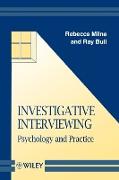- Start
- Investigative Interviewing
Investigative Interviewing
Angebote / Angebote:
Well-informed and skilled interviewing is a key factor in dealing with suspects, victims and witnesses. Experienced police and investigators know this from their own practice, and there is now a substantial body of research and theory in psychology which supports this practice and can guide both training and the development of investigative work. The purpose of this book is to provide a concise and clearly written guide to the psychological concepts and research-based knowledge that can support and guide investigative interviewing. It deals in particular with: good basic practice and methods for investigative interviewinghow to deal with false confessions and unreliable or incomplete witness informationthe special problems of interviewing children and other vulnerable peoplethe process of interviewing suspects, victims, witnesses, complainants and colleaguesThis book will be of interest and value to a wide range of professionals involved in training and practice in the police or other agencies, as well as social workers, lawyers, psychologists and psychiatrists involved in forensic work. "The strength of this book lies in its relevance for both practice and research in investigative interviewing, not only in Britain but internationally. Based on psychological theory and research, it provides practitioners with a wealth of information and specific guidelines to help improve their interviewing skills. Researchers are challenged to address some of the, as yet, unanswered questions." Janet Jackson, Netherlands Institute for the Study of Criminality and Law Enforcement, Leiden, The Netherlands This book is published in the Wiley Series in the Psychology of Crime, Policing and Law Series Editors: professor Professor Graham Davies University of Leicester, UK, and Professor Ray Bull University of Portsmouth, UK
Folgt in ca. 15 Arbeitstagen
